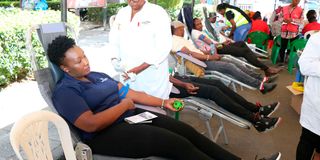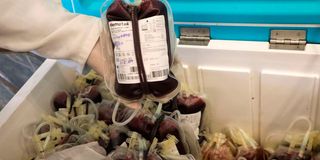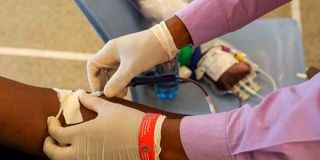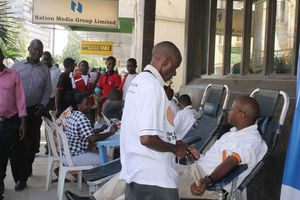
Kenyans joined by Nakuru-based journalists donate blood at Maasai Market in Nakuru City on February 14, 2025.
Senators have launched investigations into persistent blood shortages amid untold suffering by patients in need of transfusion.
The legislators have now trained their guns on the Kenya National Blood Transfusion Services (KNBTS). The development follows an acute shortage of the precious commodity, which continues to negatively impact emergency cases and routine medical procedures. Kenya has long struggled with a chronic blood shortage, with stocks often running dangerously low, forcing critically ill patients to rely on relatives and well-wishers for life-saving donations.
Kenya requires 500,000 to one million units annually but manages to collect only between 150,000 and 200,000 units. The Senate Health Committee has now been tasked to investigate the current state of transfusion services, including details of available blood banks and laboratory reagents.
The committee, chaired by Uasin Gishu Senator Jackson Mandago, is to get to the bottom of reasons behind the persistent blood shortage and the measures being taken by the Ministry of Health and the KNBTS to ensure the consistent availability of transfusion services and blood reagents.
Alarm raised
Machakos Senator Kavindu Muthama raised the alarm over the acute shortage. “We need to be told the measures and strategies in place to enhance public education and awareness campaigns regarding the reluctance of Kenyans to donate blood and demystify the reasons, myths and beliefs that may lead to this reluctance,” she said.
The move comes after the Ministry of Health said more than Sh2.7 billion is needed to forestall a possible collapse of the service, sounding a warning that transfusion services could grind to a halt. The situation has been occasioned by abrupt funding cut by the US that has affected some World Bank programmes.

Packs of blood at Sikh Union, Nairobi on June 23, 2024 Lucy
The World Bank's support covered crucial aspects such as blood collection, testing for infectious diseases, processing blood components and digitalising the system. In 2020, the US ended its Sh2 billion annual support for Kenya’s blood services, prompting the government to seek alternative funding from the World Bank.
While the US continued to fund Damu KE, the digital blood donation management system, it withdrew this support last month, worsening the crisis.
Kenya requires 1,000,000 units of blood in its banks at all times. However, current supplies are significantly lower, leaving out many patients in need because of insufficient supplies.
Nominated Senator Beatrice Ogola said the government must plan in advance by having blood bank centres across the country.
She pointed out that there must be not only adequate blood but blood that hospitals and members of the public can access any time and with speed, citing the number of road accidents reported every other day as unplanned occurrences.
“The need for blood is not only limited to accident victims that we have. We also have sick people who need blood to be sustained. We have often heard of people who lost their lives because blood was not available,” she said. “This must be discussed by the Committee when you finally give your direction, and we should never see a situation where there is a lack of blood in this country.”

A medic assists a donor during a blood donation exercise at the Sikh Union, Nairobi, on June 23, 2024.
Availability of blood is crucial for saving those with life-threatening conditions, highlighting the urgent need for donation.
However, many people are reluctant to donate for various reasons, including a weak donation culture, apathy, negative myths and beliefs, low community or public awareness, and, most importantly, fear that their blood may not be safe because of concerns about diseases like hepatitis B, HIV/Aids and cervical cancer.
The KNBTS has six regional transfusion centres—Nairobi, Embu, Nakuru, Eldoret, Kisumu, and Mombasa and 14 satellite centres located in Machakos, Kisii, Voi, Meru, Naivasha, Kakamega, Kericho, Nyeri, Garissa, Malindi, Thika, Lodwar, Bungoma and Kitale.
Collections
According to the Health ministry, the government previously collected 450 blood units daily before the emergence of Covid-19, which reduced daily collections to between 120 to 140 units. Nonetheless, the demand for transfusion has risen in recent decades as population grows, road accidents increase and diseases emerge.
Besides victims of road accidents, the others affected are women seeking maternity services, chemotherapy, and radiotherapy cancer patients depending on donations.
comulo@ke.nationmedia.com






